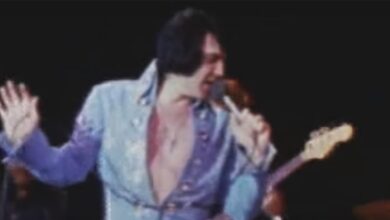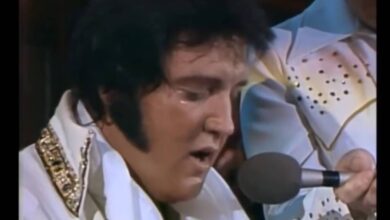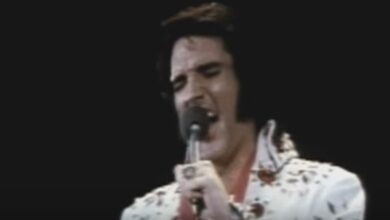Hearing This Never Fails To Take My Breath Away And Ignite A Deep Yearning For Him
The rehearsal of Elvis Presley’s Gospel Medley for the 1968 Comeback Special serves as a significant moment in music history, showcasing the deep emotional ties that Elvis had to his roots in gospel music. This event not only marked a pivotal return to live performance but also emphasized the enduring influence of gospel in his artistic expression. The medley features three well-known gospel songs: “Sometimes I Feel Like a Motherless Child,” “Where Could I Go But to the Lord,” and “Up Above My Head.” Each song encapsulates distinct aspects of faith, longing, and joy, reflecting the multiplicity of human experience.
As the rehearsal begins with “Sometimes I Feel Like a Motherless Child,” the emotional intensity is palpable. Elvis’s rich, soulful voice is immediately striking, drawing the listener into the narrative of the song. The lyrics resonate deeply, communicating feelings of abandonment and yearning. Elvis’s rendition goes beyond mere technical performance; it becomes an intimate, personal expression of his own struggles. His ability to convey raw emotion through music is one of the defining characteristics of his artistry. This song, often associated with the African American spiritual tradition, has been a fundamental part of his musical journey, rooted in the gospel music he encountered during his formative years.
Transitioning into “Where Could I Go But to the Lord,” the mood shifts as the song’s themes focus on solace and faith. Here, Elvis displays a remarkable control over his vocal dynamics, allowing his voice to swell with conviction. The repetition within the song mirrors the longing for spiritual refuge, and Elvis’s compelling delivery amplifies this sentiment. During the rehearsal, the interaction with his band and backing singers underscores the communal aspect of gospel music, revealing how collaboration enhances the performance’s emotional impact. This connection speaks to Elvis’s commitment to the genre and his respect for its roots, demonstrating that gospel music remained an anchor throughout his career.
The concluding song, “Up Above My Head,” introduces a vibrant energy that balances the medley beautifully. This uptempo piece shifts the emotional landscape from reflection and searching to one of celebration and joy. Elvis’s enthusiasm is contagious, inviting both the performers and audience to engage with the uplifting rhythm. His delivery captures the carefree spirit inherent in the song, marked by the iconic refrain “Up above my head, I hear music in the air.” The spirited nature of this performance offers a testament to Elvis’s versatility as an artist, as he masterfully navigates from somber reflection to joyous exultation within a single medley.
Diving deeper into the rehearsal footage provides rich insights into Elvis’s creative process. Observing his interactions with his musicians reveals a collaborative spirit that drove the performance. He exchanges suggestions and plays with vocal inflections, showing a willingness to explore the material. This behind-the-scenes look is enlightening, as it highlights the meticulous preparation that underscores the public persona of the star. Elvis’s dedication to achieving the emotional depth and authenticity of each performance indicates his respect for the music’s power—a reflection of his lifelong passion for artistry.
Elvis Presley’s relationship with gospel music extends beyond mere performance; it is interwoven into the fabric of his identity as an artist. Growing up in the South, he was immersed in spirituals and church music, which shaped his vocal style and artistic sensibilities. Gospel songs often served as a source of inspiration, providing comfort and a sense of community. It is significant that many of his performances included gospel elements, illustrating how these songs manifested his core values and beliefs as reflected in his musical choices.
The 1968 Comeback Special itself became a defining moment in Elvis’s career. After several years primarily focused on film, the special allowed him to reconnect with the live audience. This medley, as part of the broader performance, not only marked his return to the stage but also reaffirmed his status as a musical icon. The special was a pivotal moment of resurgence, encapsulating both nostalgia and innovation, and it showcased a matured artist ready to reclaim his place in the music world amidst changing cultural dynamics.
Every note and lyric from the Gospel Medley reflects Elvis’s profound spiritual connection and artistic vulnerability. While the songs may be deeply rooted in tradition, Elvis has a unique ability to reinterpret them through his lens—infusing each performance with his signature flair. This medley is a testament to his legacy, illustrating the profound impact that gospel music had on his life and career. The medley not only captures moments of sadness and joy but also serves as a reminder of the universal quest for faith, belonging, and hope.
Looking back on the rehearsal and final performance of the Gospel Medley, one can’t help but appreciate Elvis Presley’s artistic genius. His ability to transition through various emotional states, all while maintaining a strong vocal performance, highlights the complexities of his artistry. This unique connection to gospel music emphasizes both the spiritual and emotional dimensions of his work. It is a remarkable showcase of how gospel music transcends genres, providing a powerful means of expression and connection to the audience.
In reflection, the rehearsal of Elvis Mother’s Gospel Medley for the 1968 Comeback Special is far more than just a performance; it is a narrative of faith, emotion, and connection, resonating with listeners and transcending time. Elvis Presley’s legacy in music is deeply intertwined with his roots in gospel, ensuring that these performances continue to inspire and move audiences long after their original airing. Through each note, every word, and the heartfelt delivery, Elvis not only shared his personal journey but also tapped into collective experiences that resonate with the core of the human spirit.



